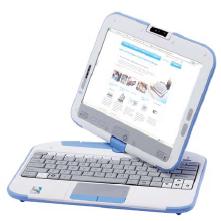Appropriate Technology: The New Intel Classmate PC
Yesterday I got a sneak peak at the new Intel Classmate PC, both the clamshell and convertible models. These new models are significant upgrades from the previous version. While I never really wanted my own mini-laptop, I now have Classmate envy.
Highlights that mattered to me included (drum roll please):
- 10.1 inch screen to replace the tiny 8.9 inch screen – as a result the keyboard is bigger,
 accommodating adolescent and even adult fingers. Honestly, the previous design was just too dang small. My fingers were all over each other.
accommodating adolescent and even adult fingers. Honestly, the previous design was just too dang small. My fingers were all over each other. - Ruggedization (is that a word?) – now designed to withstand accidental drops from desk height, with a water resistant LCD, keyboard, touch pad, HDD shock protection using the accelerometer to detect falls, and a really nice rubberized surface making it easier to hold onto.
- Retractable handle – while I’m on the topic of holding it… may I say that I really don’t understand why other PC vendors don’t put handles on their laptops. My Panasonic Toughbook has one and I love it.
- eReader interface – while I’ve never used my Kindle (really, not once), I do think I’d take advantage of the eReader capability of the Classmate. The accelerometer flips the content to portrait and the touchscreen allows you to “flick to scroll.” You can also highlight and take notes directly on the page. The eReader feature was what Wired magazine picked up on in their Classmate product review.
- Tethered stylus – the convertible style also comes with a chunkier pen-like stylus, with a hook and tether so you don’t lose it – a nagging fear I’ve had about mine. To accompany the stylus and the touchscreen, Classmate includes handwriting recognition and note-taking software.
- Other enhancements – of course, as in any upgrade, the Classmate comes with more storage, a longer battery life and additional connectivity options.
What more could a student want?
Well, perhaps a lighter weight device. I almost dropped it when it was handed to me (not that it would have been a problem). All of the new features – bigger, more rugged – add additional heft. It’s not going to go unnoticed in a book bag or backpack. Nor are the new features going to go unnoticed on a student budget. According to Intel, the new model is about $50 more than the previous model which makes it run about $525 retail. At that price, if the goal is to give each student a personal computer, the cost of 1-to-1 computing can really add up.
There are many critics of the 1-to-1 computing model for education – particularly in emerging markets – for exactly that reason. The argument centers on the fact that shared access is more appropriate in regions with limited resources. While I do recognize the budget constraint – and the additional cost would be significant – it doesn’t need to be a show-stopper for the Classmate PC. 1-to-1 computing doesn’t mean that the children need to have their own PC. It implies that they will be able to use the device individually. They touch, feel, and really use the device by themselves in the classroom. This brings the reality of computing and ICT into their hands. A set of Classmate PCs can be shared across classro oms, and in fact, many programs that Intel works with are doing just that. Remember the Book Mobile that pulled up in a parking lot, or the music cart that the teacher pulled around from class to class. In emerging markets, you might run into the bibliomulas (book mules) in Venezuela or book camels in Kenya. These are examples of shared access – using a locally appropriate delivery model – but with books or musical instruments that children could touch, feel, borrow and read or play.
oms, and in fact, many programs that Intel works with are doing just that. Remember the Book Mobile that pulled up in a parking lot, or the music cart that the teacher pulled around from class to class. In emerging markets, you might run into the bibliomulas (book mules) in Venezuela or book camels in Kenya. These are examples of shared access – using a locally appropriate delivery model – but with books or musical instruments that children could touch, feel, borrow and read or play. 
In fact, Intel is working with local partners to develop the locally appropriate accessories. Intel provides the reference architecture (and, of course, the chip), but they source the manufacturing to local OEMs with whom they work closely to deliver an entire solution that includes hardware, educational software, networking, security, storage and management infrastructure, a rural connectivity platform, services and even solar-powered charging carts… the new Computer Mobile.
The new Classmate PC is not just a cheap computer for kids or for developing countries. It is a valuable educational tool.